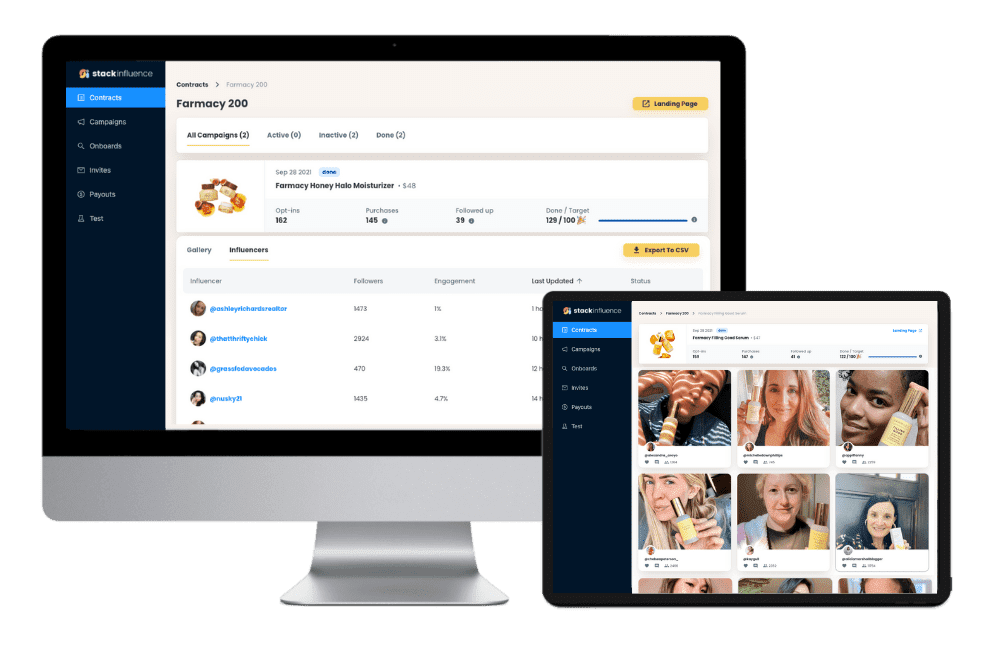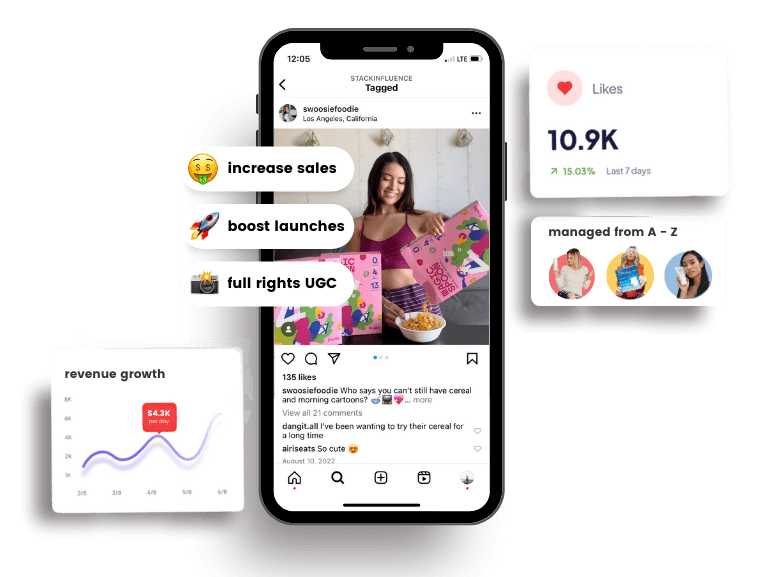How to Find Bloggers to Promote Your Product
24th
October, 2025
Influencer Marketing
Amazon Marketplace
Artificial Intelligence
TikTok Tips
In the age of influencer marketing, brands of all sizes – from indie e-commerce startups to Amazon sellers – are looking to find bloggers to promote their products. Why bloggers and not just celebrity influencers? Because today’s consumers trust authentic voices and peer recommendations. In fact, influencer marketing has become nearly ubiquitous: 86% of U.S. marketers will partner with influencers in 2025, with a strong shift toward micro-influencers (niche bloggers and content creators with smaller, loyal followings). These micro influencers often deliver higher engagement and ROI than big-name celebs, making them ideal partners for promoting products in a genuine way. So how do you actually find the right bloggers to boost your brand? This comprehensive guide will walk you through effective strategies – with a casual, informative tone – to help you find bloggers to promote your product and grow your business.
Why Bloggers Are Key for Promotion
Bloggers and micro-influencers bring something that traditional ads or mega-celebrity endorsements often lack: trust and authenticity. Because they typically focus on a niche and engage closely with their readers/followers, their recommendations “feel like a friend” giving advice. The numbers back this up – micro-influencers (~10k–100k followers) average about 3.9% engagement, vs. just ~1.2% for macro-influencers with huge audiences. That higher engagement isn’t just a vanity metric; it signals that their followers are paying attention and more likely to be influenced by what the blogger says.
This credibility translates into real impact on purchasing decisions. Consumers today consider user-generated content (UGC) 50% more trustworthy and 20% more influential than other media types. In other words, a sincere blog review or social post from a content creator can sway opinion more than a polished brand ad. When you find bloggers to promote your product, you’re leveraging this trust factor. Even big brands are shifting to micro and nano-influencers – marketers now prefer micro-influencers 10× more often than mega-celebrities as partners. For a product company, especially an e-commerce brand or Amazon seller, teaming up with a network of enthusiastic micro-influencer bloggers can yield better returns than one expensive celebrity campaign.
And the ROI can be impressive. Influencer marketing as a whole returns about $5–$6.50 for every $1 spent on average, but micro-influencer campaigns often exceed this. For example, a Stack Influence micro-influencer campaign for an e-commerce brand achieved a 13:1 ROI – 211 micro creators drove $129,280 in Amazon sales from a ~$9,917 spend (1300% ROI). Results like this are hard to match with a single big influencer. It’s no surprise that brands (including Amazon marketplace sellers) are using hundreds of micro-influencers to drive product sales and search rank on Amazon. The bottom line: finding the right bloggers and content creators to promote your product can dramatically boost engagement, trust, and ultimately sales.

Unlock the Power of Micro Influencers and Elevate your Brand Today!

6 Strategies to Find Bloggers to Promote Your Product

Finding the perfect bloggers or micro-influencers for your brand might feel like searching for a needle in a haystack, but with the following strategies, you can streamline the process. From leveraging specialized platforms to old-fashioned Google searches, here are six proven ways to discover bloggers who can authentically promote your product:
1. Utilize Influencer Marketing Platforms
Platforms dedicated to influencer marketing are a fast-track to finding quality bloggers and micro-influencers. Services like Stack Influence (among others like Upfluence, Modash, Shopify Collabs, etc.) maintain marketplaces of vetted content creators across Instagram, YouTube, blogs, and more. These platforms let you filter influencers by niche, follower count, engagement rate, location, and other criteria to pinpoint those who align with your product. They also handle a lot of the heavy lifting – from outreach and contracts to tracking campaign performance – which saves you time. Influencer networks are incredibly scalable: rather than pitching bloggers one by one, you can tap into a large pool at once.
For example, Stack Influence’s platform connects brands with a network of over 11 million micro and nano influencers across niches. That means whatever your product category (beauty, tech, pet care, etc.), you can instantly find hundreds of potential bloggers who already create content in that space. Using an influencer platform as your first step can quickly yield a list of interested micro-influencers to work with. Plus, these platforms often use data and AI to match your brand with ideal creators, taking the guesswork out of discovery. In short, leveraging an influencer marketing platform (with Stack Influence as an example) is one of the easiest and most effective ways to find bloggers to promote your product – especially if you’re looking to scale up a micro-influencer campaign efficiently.
2. Leverage Search Engines and Blog Directories
Sometimes, the simplest approach is the best: head to Google and search for bloggers in your niche. A basic Google query like “[Your Industry] bloggers” or “Top [Product Category] blogs” can surface a plethora of roundup posts and lists of top blogs in your niche. For instance, searching “best tech gadget blogs” might yield articles that list popular tech bloggers. These roundup posts are goldmines – they’ve done the initial work of identifying active bloggers. Comb through those lists and visit the blogs to see which ones match your target audience and could feature your product naturally. Pay attention to whether the blog is active and has engagement (comments, social shares) on recent posts. If the content and audience look like a fit, add them to your prospect list.
Beyond simple Google searches, you can also use advanced search operators (like intitle: or inurl: queries) to narrow results – for example, searching “product review” + [Your Product Type] might find individual blog review posts or niche review sites. Additionally, consider specialized blog directories or influencer databases. Websites like Bloglovin’, AllTop, or even niche-specific forums can help you discover bloggers by category. While search engines are a great starting point, be prepared to dig a bit – you may need to click through to page 2 or 3 of results and explore various listicles and community sites to find those hidden gem bloggers in your market. With a curated list from Google and directories, you’ll have a solid foundation of potential bloggers to reach out to.
3. Search Social Media & Hashtags for Content Creators

Not all influencers promote themselves as “bloggers” on Google – many are more active on social media platforms. A lot of today’s bloggers also have Instagram or TikTok accounts where they post content. To find these creators, use social media search functions and hashtags. On platforms like Instagram, Twitter (X), TikTok, or Pinterest, try searching keywords or hashtags related to your niche plus terms like “blogger”, “influencer”, “review” or “#ad”. For example, a skincare brand might search for hashtags like #skincareblogger, #beautyreview, or #selfcare to find posts by people who review products. Many blog niches have their own community hashtags – e.g. #lbloggers (lifestyle bloggers) or #psblogger (plus-size fashion bloggers) are specific tags bloggers use. Searching these can reveal a whole community of creators. Scroll through those hashtag feeds and note which users consistently post quality content and get engagement.
You can also search broader terms like “<niche> influencer” or “<product> review” on Instagram or YouTube to find micro-influencers who might not rank on Google. Another trick: on Twitter or TikTok, search your product name or category – you may find people organically talking about similar items. Social media is also useful for gauging a creator’s follower count and engagement at a glance. Once you identify a potential blogger via social, check if they have a blog link in their bio or a Linktree; many Instagram influencers also maintain a blog or newsletter. Don’t forget Facebook and LinkedIn groups as well – there are blogger groups (e.g. travel blogger communities, tech reviewer circles) where members share their latest posts. Joining and browsing those groups can lead you to influencers who might not be immediately visible elsewhere. In summary, be active on social platforms and use hashtags like a radar to find bloggers and content creators buzzing about topics in your industry.
4. Monitor Brand Mentions and Competitor Mentions
One of the easiest targets for outreach is someone who’s already talking about your product or a product like yours. There may be bloggers out there who have mentioned your brand in passing, or reviewed a similar item from a competitor – these are warm leads. Start by setting up Google Alerts or using a social listening tool to catch any mention of your brand or product name on blogs and social media. Tools like BrandMentions can help ensure you “don’t miss a single online mention of your business”.
If a blogger has written about you without any prompt, they might be very receptive to a partnership (after all, they found you on their own). Next, look at your competitors or adjacent products. Search “[Competitor Product] review” or “[Competitor] blog post” – if you find bloggers who reviewed a similar product, you can approach them to try yours as well. For example, if you sell eco-friendly water bottles and find a blogger who reviewed another eco-bottle brand, that blogger could be interested in reviewing yours. They already cover that niche. Also, check who’s linking to or talking about competitor brands on forums and social media; those could be micro-influencers to engage. By seeing who is mentioning your brand or similar products, you not only find bloggers who are likely relevant, but you also open the door with an icebreaker (“I saw you tried X brand, we have a similar product you might love…”). This strategy can uncover niche bloggers that a generic search might miss, and because they’re already knowledgeable in your area, they can produce high-quality, authentic content if they partner with you.
5. Tap into Blogger Communities & Niche Networks
Don’t overlook the power of communities where bloggers themselves hang out. Many content creators network with each other, and where there’s one, there are often more. Start by reading popular blogs in your niche regularly – not only will you stay on top of trends, but you’ll notice patterns like which bloggers get mentioned or linked by others. For instance, a top parenting blog might occasionally mention other “mommy bloggers” or guest post with them. Those mentions are breadcrumbs leading you to additional creators. Keep an eye on blogrolls or “favorite blogs” lists that some bloggers feature on their site – it’s a quick way to find related bloggers who have a mutual network. Additionally, join online forums or groups focused on blogging and influencer collaborations. Websites like Reddit have subreddits such as r/Bloggers or r/InfluencerMarketing where people discuss opportunities.
Facebook groups are also plentiful (e.g. “Beauty Bloggers Unite” or “Travel Bloggers & Influencers” groups) – join a few relevant ones and observe; you might find bloggers seeking collaboration or open to product pitches. Another avenue is attending virtual events, webinars, or conferences for your industry where influencers participate. For example, if you have a food product, a food bloggers conference or a webinar on recipe blogging could introduce you to engaged bloggers in that sphere. Don’t forget influencer marketing forums like Aspire IQ or Collabstr (influencer marketplaces) which can function as communities where creators list themselves for hire. By immersing yourself in these blogger communities, you can organically find and connect with content creators who are passionate about your niche. As a bonus, you’ll learn how they operate, which helps when you approach them for promotion.
6. Offer an Affiliate or Ambassador Program
One way to attract bloggers to you (instead of you always hunting for them) is to create incentives for collaboration. Many bloggers – especially those in e-commerce niches – monetize through affiliate marketing and brand ambassador programs. If you set up an affiliate program for your product (using a platform like Tapfiliate or Shopify Collabs, for example), bloggers can earn a commission for sales they drive. Publicize your affiliate or referral program on your website (“Calling all content creators – earn when you promote our product!”) to draw interested bloggers. This approach is a win-win: the blogger gets income or perks, and you get exposure to their audience. Amazon sellers often leverage this by working with participants in the Amazon Associates program or Amazon Influencer Program – a blogger can use a special affiliate link to your Amazon product and earn a cut of each sale, which motivates them to review or feature you.
Similarly, you can create a brand ambassador program where you give bloggers free products, discount codes for their followers, or other VIP perks in exchange for them posting about your brand regularly. These programs can turn content creators into long-term partners. For instance, a fitness apparel brand might recruit micro-influencer bloggers as ambassadors who get early access to new releases, and in return they showcase those items in their blogs and social feeds. When structuring such a program, make it easy and rewarding – provide creators with trackable links or coupon codes, shout them out on your brand’s channels (bloggers love recognition), and even consider a tiered reward system (higher commission or bonuses for top performers). By fostering a community of affiliates/ambassadors, you’ll naturally attract more bloggers over time through word-of-mouth. Remember, the concept of brands partnering with bloggers isn’t new – it dates back to early influencer marketplaces in the mid-2000s – and it remains effective when you align incentives. So set up that program, spread the word, and let interested bloggers come to you as advocates.

Unlock the Power of Micro Influencers and Elevate your Brand Today!

Conclusion to How to Find Bloggers to Promote Your Product
Finding the right bloggers to promote your product is only step one – the real magic happens in the relationships you build. Once you connect with promising micro-influencers or content creators, focus on authentic, mutually beneficial partnerships. Provide them with all the info and support they need (free product samples, insider tips, discount codes for their audience, etc.) and allow creative freedom so their content stays genuine. Keep in mind that content from these collaborations often becomes valuable marketing material for you as well – you can repurpose influencer blog posts, photos, or videos as testimonials and social proof (with permission). And because it’s coming from a real person, that content carries weight: consumers tend to trust peer recommendations far more than brand advertising. As noted earlier, UGC and micro-influencer content is perceived as significantly more trustworthy by audiences, which can greatly sway purchase decisions in your favor.
In summary, to find bloggers to promote your product successfully, use a combination of the strategies above: influencer platforms for scale, targeted searches for niche voices, social media sleuthing, monitoring who’s already talking about you, engaging with blogger communities, and offering win-win programs that entice creators. By casting a wide but strategic net, you’ll compile a list of enthusiastic micro-influencers who align with your brand’s vibe. From there, treat them as long-term partners. Many brands report that consistently working with a team of micro-influencer bloggers yields higher ROI and sustained buzz versus one-off big campaigns. Your product gains not just a sales boost, but also a network of genuine advocates.
Finally, always prioritize fit and authenticity over sheer follower numbers. A micro blogger with a small but loyal audience in your niche can often drive more real engagement and sales than a larger influencer with an unrelated following. The goal isn’t just to have bloggers talking about your product – it’s to have the right bloggers genuinely enthusiastic about it. Find those gems, nurture the relationship, and you’ll see the impact in increased brand awareness, trust, and revenue. Happy influencer hunting, and may your product find its way into all the right blog posts and social feeds!

By William Gasner
CMO at Stack Influence
William Gasner is the CMO of Stack Influence, he's a 6X founder, a 7-Figure eCommerce seller, and has been featured in leading publications like Forbes, Business Insider, and Wired for his thoughts on the influencer marketing and eCommerce industries.
Want new articles before they get published? Subscribe to our Awesome Newsletter.
stack up your influence
turning creativity into currency
our headquarters
111 NE 1st St, Miami, FL 33132
our contact info
[email protected]
stack up your influence
turning creativity into currency
our headquarters
111 NE 1st St, 8th Floor
Miami, FL 33132


